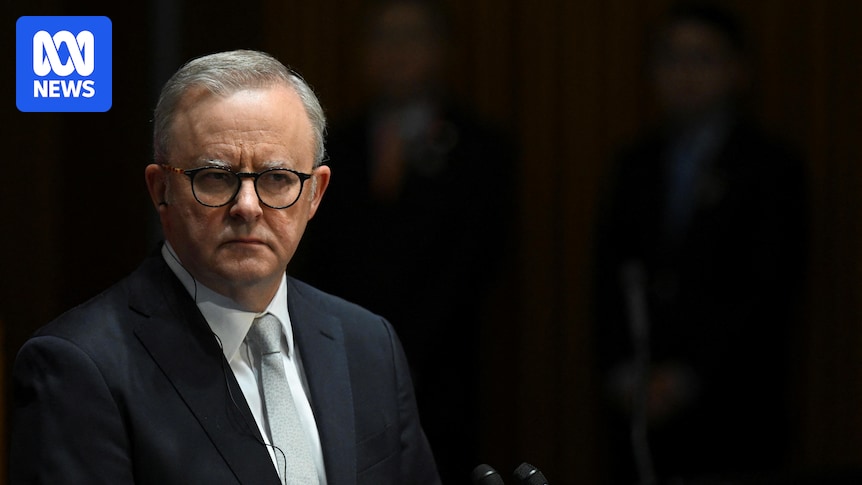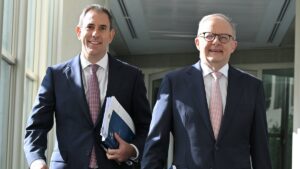
As Australian Prime Minister Anthony Albanese embarks on a crucial diplomatic visit to China, the United States has added a layer of complexity by demanding clarity on Australia’s military stance in the event of a conflict involving Taiwan. This request comes amid a backdrop of perceived unpredictability in US foreign policy, particularly under the leadership of President Donald Trump.
The timing of this demand is particularly striking, as it coincides with Albanese’s efforts to strengthen economic ties with China while addressing sensitive geopolitical issues. The US’s insistence on a clear commitment from Australia raises questions about the consistency of its own defense strategies, which have recently appeared chaotic, especially in the context of the ongoing conflict in Ukraine.
US Foreign Policy: A Chaotic Landscape
Recent actions by the US have highlighted a lack of coherence in its foreign policy. Last month, the Pentagon halted the delivery of weapons to Ukraine during a critical phase of Russian aggression, citing the need to preserve US stockpiles. President Trump later admitted he was unaware of this decision, which was subsequently reversed. This episode underscores the erratic nature of US policy-making, leaving allies uncertain about America’s reliability.
In the Asia-Pacific region, the US is urging allies like Japan and Australia to declare their military intentions regarding a potential conflict with China over Taiwan. This push, led by US Defense Undersecretary Elbridge Colby, comes as the US reviews its nuclear submarine deal with Australia under the AUKUS partnership. Concerns have been raised that this deal might compromise American naval capabilities and contradict the “America First” policy.
AUKUS and Australia’s Position
Australia’s Acting Defence Minister Pat Conroy has reiterated that any decision to commit troops would be made by the government of the day, emphasizing Australia’s long-standing policy of reserving such decisions for when all facts are known. Conroy’s stance highlights the tension between Australia’s sovereign decision-making and its commitments under AUKUS, which could entail future obligations not yet fully understood.
Conroy noted that the US review of the AUKUS partnership remains incomplete, with the Australian government engaging at senior levels to ensure the pact aligns with national interests. However, the uncertainty surrounding the review’s outcome adds to the complexity of Australia’s defense strategy.
China’s Diplomatic Overture
Meanwhile, China is extending a warm welcome to Prime Minister Albanese, seeking to enhance economic relations while addressing contentious issues such as aggression in the South China Sea and human rights. This diplomatic engagement occurs as the Talisman Sabre military exercises, involving Australian and US forces, commence on Australia’s northern coast.
Conroy has acknowledged the likelihood of Chinese surveillance of these exercises, a practice that has been ongoing since 2017. He assured that Australia would monitor and adapt its activities accordingly to safeguard intelligence and operational security.
Implications for Australia-US Relations
The juxtaposition of strengthening ties with China and navigating complex demands from the US presents a challenging diplomatic landscape for Australia. Treasurer Jim Chalmers has expressed the need to transition Australia’s relationship with China from stabilization to strengthening, recognizing the economic benefits of such a shift.
However, the evolving dynamics with the US, marked by skepticism over its unpredictable leadership, suggest a parallel need to reassess and potentially fortify this crucial alliance. The specter of impending tariffs on Australian pharmaceuticals adds another layer of complexity to this relationship.
In this context, Australian economist Justin Wolfers, based in the US, offers a candid perspective:
“Part of me that’s an Australian finds the following very painful — the answer is nobody over here cares. But it’s not just Australia, in fact, that’s been the same disdain they’ve treated far larger economies.”
As Prime Minister Albanese navigates these diplomatic waters, the balance between economic opportunities and strategic alliances remains delicate. The outcomes of his visit and the ongoing defense negotiations will shape Australia’s geopolitical landscape in the years to come.







